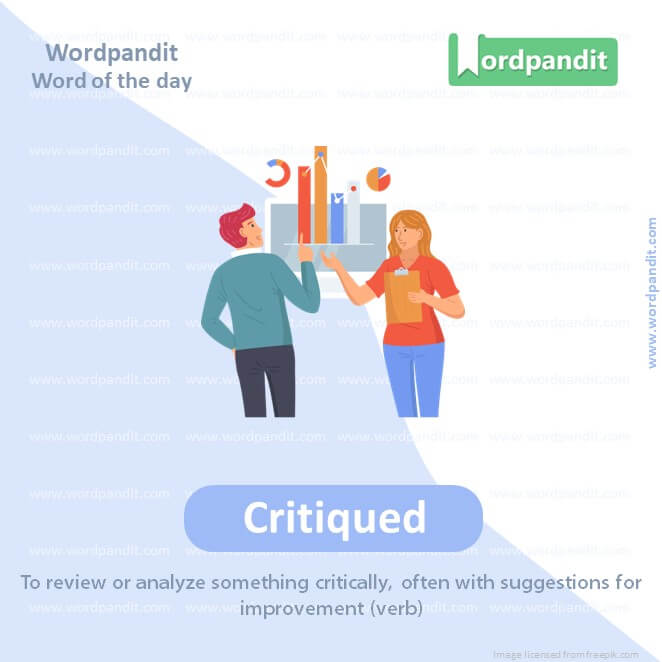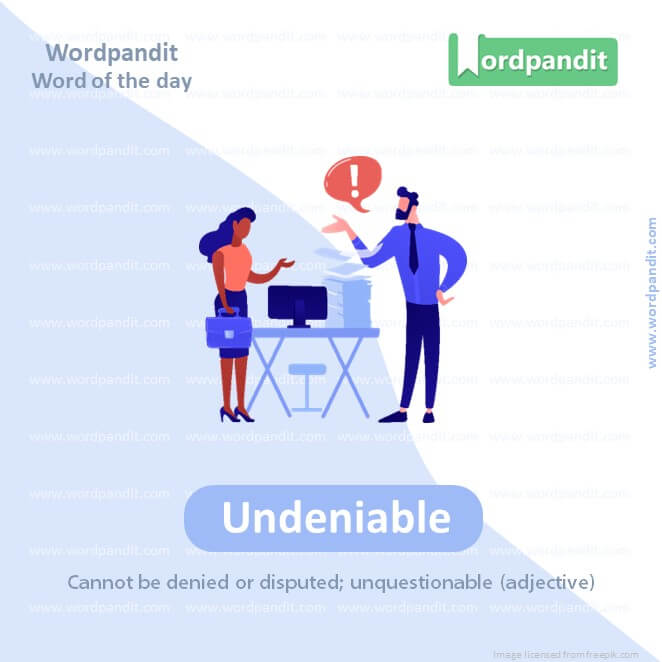Daily Vocabulary Words: List of Daily Used Words in Leading Indian Newspapers
Hi there. Welcome to this special section @ Wordpandit. Our endeavour here is straightforward: highlighting daily vocabulary words that you would come across in leading newspapers in the country. We have included the following newspapers in our selection:
• The Times of India
• The Economic Times
• Hindustan Times
• Mint
• Indian Express
We are putting in extensive work to develop your vocabulary. All you have to do is be regular with this section and check out this post daily. This is your repository of commonly used words; essentially, we are posting a list of daily used words. Hence, this has significant practical application as it teaches you words that are commonly used in leading publications mentioned above.
Visit the website daily to learn words from leading Indian newspapers.
WORD-1: Exaggeration
CONTEXT: It will not be an exaggeration to argue that almost all last-mile road connectivity in India, both for passengers and goods, works on the principle of, safety be damned but let us cut costs.
SOURCE: Hindustan Times
EXPLANATORY PARAGRAPH: Imagine you’re telling a story about a fish you caught, and you say it was as big as a whale when it was actually just a tiny fish. That’s what exaggeration means. It’s when we make something sound much bigger, scarier, or more exciting than it really is, kind of like adding extra sprinkles to your ice cream to make it seem even more delicious.
MEANING: To make something seem bigger, better, or more important than it really is (verb).
PRONUNCIATION: ig-ZAJ-uh-RAY-shun
SYNONYMS: overstatement, embellishment, hyperbole, magnification, amplification
USAGE EXAMPLES:
1. Sarah tends to exaggerate the size of the fish she catches.
2. Don’t exaggerate your accomplishments on your resume.
3. Grandma always exaggerates about how much she used to walk to school.
4. He exaggerated the danger of the situation to make his point more persuasive.

WORD-2: Nurtured
CONTEXT: Free market fundamentalism has nurtured the growth and global eminence of the social media industry.
SOURCE: Indian Express
EXPLANATORY PARAGRAPH: Imagine you have a little plant, and you give it water and sunlight every day to help it grow big and strong. That’s what it means to nurture something. It’s like taking care of a baby bird until it’s ready to fly on its own. When we nurture something, we protect it, help it grow, and make sure it’s healthy and happy.
MEANING: To care for and encourage the growth or development of someone or
something (verb).
PRONUNCIATION: NER-cher
SYNONYMS: foster, cultivate, nourish, cherish, foster
USAGE EXAMPLES:
1. The teacher nurtured the students’ love for reading by introducing them to different books.
2. She nurtured her garden by watering it regularly and removing weeds.
3. Parents should nurture their children’s interests and talents.
4. The organization is dedicated to nurturing young artists and helping them succeed.

WORD-3: Critiqued
CONTEXT: She also critiqued the policy of airlines to, on the one hand, mandate that persons with disabilities must sit in the first row of the plane, and, on the other, to prevent them from sitting in the exit row.
SOURCE: Hindustan Times
EXPLANATORY PARAGRAPH: Imagine you bring your drawing to your art class, and your teacher looks at it very carefully and tells you what parts you did well and what parts you need to improve. That’s what it means to be critiqued. It’s when someone gives you feedback to help you get better at something, like drawing, writing, or playing a game.
MEANING: To review or analyze something critically, often with suggestions for
improvement (verb).
PRONUNCIATION: kri-TEKT
SYNONYMS: evaluate, assess, review, analyze, judge
USAGE EXAMPLES:
1. The writer critiqued the novel, pointing out its strengths and weaknesses.
2. She asked her friend to critique her presentation before the big meeting.
3. The chef critiqued the dish, suggesting ways to improve the flavor.
4. In art class, students often critique each other’s work to learn and improve.

WORD-4: Undeniable
CONTEXT: The world struggles to contain the toxic legacies of 2023 — cruel regional wars, civic conflicts and undeniable stories of anthropogenic harms — technocrats, ecocrats, and bureaucrats across the world continue to device and launch quiet initiatives portending a better and larger future for human rights.
SOURCE: Indian Express
EXPLANATORY PARAGRAPH: Imagine you have a favorite toy that you always play with, and no matter what, you know it will always be there for you. That’s what it means for something to be undeniable. It’s like when you ask your friend if they want ice cream, and they nod their head so enthusiastically that you just know they can’t resist ice cream.
MEANING: Cannot be denied or disputed; unquestionable (adjective).
PRONUNCIATION: uhn-dee-NY-uh-buhl
SYNONYMS: indisputable, irrefutable, unquestionable, incontrovertible, unmistakable
USAGE EXAMPLES:
1. The evidence against the suspect was undeniable.
2. His talent as a musician was undeniable from a young age.
3. The beauty of the sunset was undeniable.
4. Their friendship was built on undeniable trust and loyalty.

WORD-5: Testament
CONTEXT: It was a testament to the transformative power of technology to break down the barriers that the disabled face in the physical world.
SOURCE: Hindustan Times
EXPLANATORY PARAGRAPH: Imagine you’re building a tower out of blocks, and each block you add is like a promise or a statement about something you believe in or want to prove. That’s what a testament is. It’s like a big sign or symbol that shows everyone what you believe in or stand for, like when you wear a superhero cape because you want to show everyone that you’re brave and strong.
MEANING: A clear sign or proof of something.
PRONUNCIATION: TES-tuh-muhnt
SYNONYMS: evidence, proof, indication, demonstration, declaration
USAGE EXAMPLES:
1. The ancient ruins are a testament to the advanced civilization that once lived there.
2. Her success in the competition was a testament to her hard work and dedication.
3. The painting is a testament to the artist’s skill and creativity.
4. His honesty and integrity are a testament to his character.

WORD-6: Appetite
CONTEXT: Portions of different asset classes in the proportion that serves your age, goals and risk appetite.
SOURCE: Hindustan Times
EXPLANATORY PARAGRAPH: Imagine you’re at a birthday party, and there’s a big table full of delicious snacks and treats. Your appetite is that growling feeling in your tummy that says, “Yum, I want to eat everything!” It’s like when you see your favorite food and you can’t wait to take a big bite because it looks so tasty.
MEANING: A natural desire to satisfy a bodily need, especially for food (noun).
PRONUNCIATION: AP-i-tahyt
SYNONYMS: hunger, craving, desire, longing, thirst
USAGE EXAMPLES:
1. After playing outside all day, he had worked up quite an appetite.
2. The delicious smell of baking bread awakened her appetite.
3. The appetizers served at the party whetted everyone’s appetite for the main course.
4. She had no appetite after feeling sick all morning.
WORD-7: Portending
CONTEXT: The world struggles to contain the toxic legacies of 2023 — cruel regional wars, civic conflicts and undeniable stories of anthropogenic harms — technocrats, ecocrats, and bureaucrats across the world continue to device and launch quiet initiatives portending a better and larger future for human rights.
SOURCE: Indian Express
EXPLANATORY PARAGRAPH: Imagine you’re outside playing and you notice dark clouds gathering in the sky. You might think that something exciting or scary is going to happen soon, like a big storm. That’s what it means when something is portending. It’s like a warning sign or a clue that tells you what might happen next, like when you hear a loud clap of thunder and know that rain is on the way.
MEANING: Serving as a sign or warning that something, especially something bad, is likely to happen (adjective).
PRONUNCIATION: pawr-TEN-ding
SYNONYMS: foreboding, ominous, foreshadowing, predicting, prophetic
USAGE EXAMPLES:
1. The sudden drop in temperature was a portending sign of the coming snowstorm.
2. His silence during the meeting was portending of his resignation.
3. The dark clouds gathering overhead were portending a heavy rain.
4. The eerie silence in the haunted house was portending of something spooky about to happen.
WORD-8: Normative
CONTEXT: A “system-wide normative and operational framework on the use of AI in the United Nations system, based on these principles for the ethical use of AI” was finally recommended.
SOURCE: Indian Express
EXPLANATORY PARAGRAPH: Imagine you’re playing a game with your friends, and you all agree to follow a certain set of rules. Those rules are like the normative way to play the game, meaning they’re the usual or typical way that everyone agrees to do things. It’s like when you play tag, and everyone knows that if you get tagged, you’re “it” and have to chase the others.
MEANING: Describing or establishing a standard or norm; conforming to or based on norms (adjective).
PRONUNCIATION: nawr-muh-tiv
SYNONYMS: standard, typical, usual, conventional, customary
USAGE EXAMPLES:
1. The company’s dress code policy was normative, requiring employees to wear business attire.
2. In their culture, it was normative for families to eat dinner together every night.
3. The school had normative expectations for student behavior in the classroom.
4. Following traffic laws is normative behavior for responsible drivers.
WORD-9: Circuitous
CONTEXT: She, therefore, had to take a longer and more circuitous route to reach Kochi.
SOURCE: Hindustan Times
EXPLANATORY PARAGRAPH: Imagine you’re walking to the park, and you realize that there’s a big construction zone blocking your usual path. So, you have to take a longer way around to get there, like going down a bunch of different streets and alleys. That’s what circuitous means. It’s like taking the scenic route instead of the direct path, making a journey longer and more complicated than it needs to be.
MEANING: Longer than the most direct way; not straightforward (adjective).
PRONUNCIATION: ser-KYOO-i-tuhs
SYNONYMS: indirect, winding, meandering, roundabout, convoluted
USAGE EXAMPLES:
1. The circuitous route through the mountains took twice as long as the highway.
2. He gave a circuitous explanation instead of just admitting the truth.
3. The circuitous reasoning in her argument made it difficult to follow.
4. Instead of giving a direct answer, he took a circuitous route to avoid the question.
WORD-10: Adumbrated
CONTEXT: The principles for the ethical use of AI in the United Nations system were adumbrated in the famous UNESCO declaration which prescribes many values and principles, chief being the following: Respect, protect and promote human rights and fundamental freedoms and human dignity; ecological sustainability; diversity and inclusiveness.
SOURCE: Indian Express
EXPLANATORY PARAGRAPH: Imagine you’re drawing a picture, but you only use dark shadows and outlines instead of filling in all the details. That’s what it means to adumbrate. It’s like giving a sneak peek or a hint about something without revealing all the specifics, kind of like when you wrap a present, and you can see the shape but not what’s inside until you unwrap it.
MEANING: To outline or sketch something in a vague or preliminary way; to foreshadow or suggest something (verb).
PRONUNCIATION: uh-DUHM-breyt
SYNONYMS: outline, sketch, indicate, suggest, foreshadow
USAGE EXAMPLES:
1. The speaker adumbrated the main points of his presentation before diving into the details.
2. The artist adumbrated the design of the mural before starting to paint.
3. The early stages of the project only adumbrated the final outcome.
4. The clues adumbrated what would happen next in the mystery novel.
Vocabulary Daily Words
Among the myriad aspects of language learning, the role of ‘vocabulary daily words’ attests to their undeniable importance. These everyday words form the bedrock of communication. Whether used in casual chat or formal discussion, the fluency and understanding of ‘vocabulary daily words’ can significantly uplift the quality of interaction. However, the vital question is, how to effectively learn these ‘vocabulary daily words’?
The crux of learning ‘vocabulary daily words’ lies in a well-rounded approach that encompasses exposure, understanding, memorization, and practice. Rote memorization might seem like a quick solution, but it lacks context and, thereby, retention. Hence, opt for a diverse range of resources like books, newspapers, podcasts, and digital media. These will bring ‘vocabulary daily words’ to life, providing real-life usage examples and making the learning process inherently engaging.
Next, using memory-enhancing techniques can significantly improve retention of ‘vocabulary daily words’. Techniques such as flashcards or the Leitner System align with the principles of spaced repetition, allowing more effective and long-term learning. Incorporating mnemonic devices, associating new words with unique stories or images, can further facilitate this learning process.
The key to fully grasping ‘vocabulary daily words’ lies in practical usage. Make it a habit to use these words in your daily communications. Whether it’s a friendly conversation, a professional email, or a social media post, try integrating these new words. Doing so provides hands-on practice, strengthening your comprehension and application of these words.
In a nutshell, ‘vocabulary daily words’ are a treasure in the language learning landscape. By harnessing diversified resources, utilizing memory techniques, and actively using these words, your grip on the ‘vocabulary daily words’ will strengthen significantly. So, turn the pages, hit play, start a conversation, and let these ‘vocabulary daily words’ shape the story of your linguistic journey.










